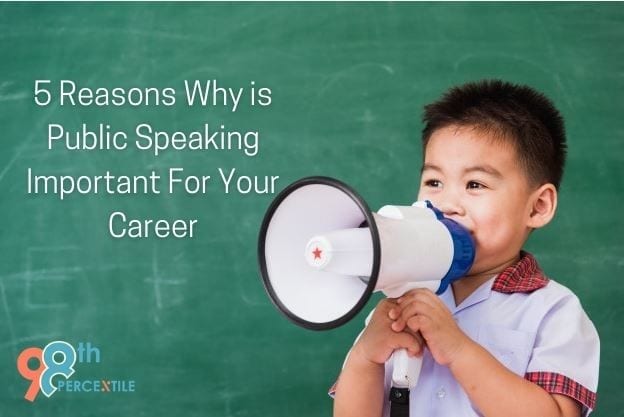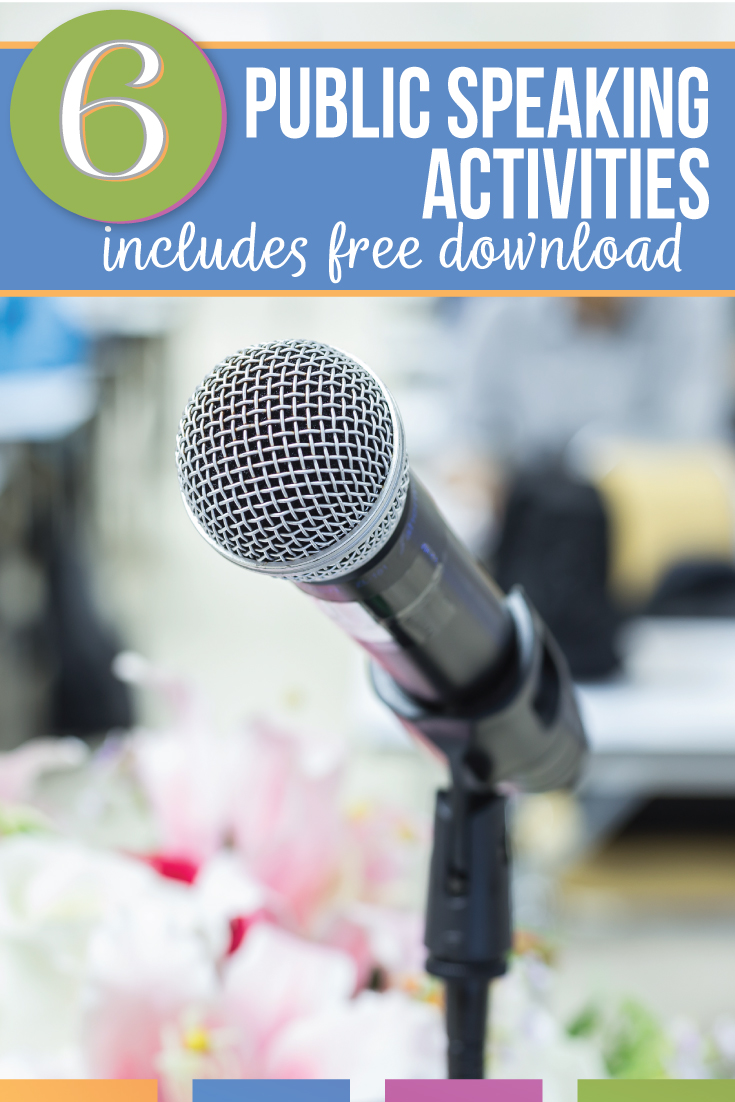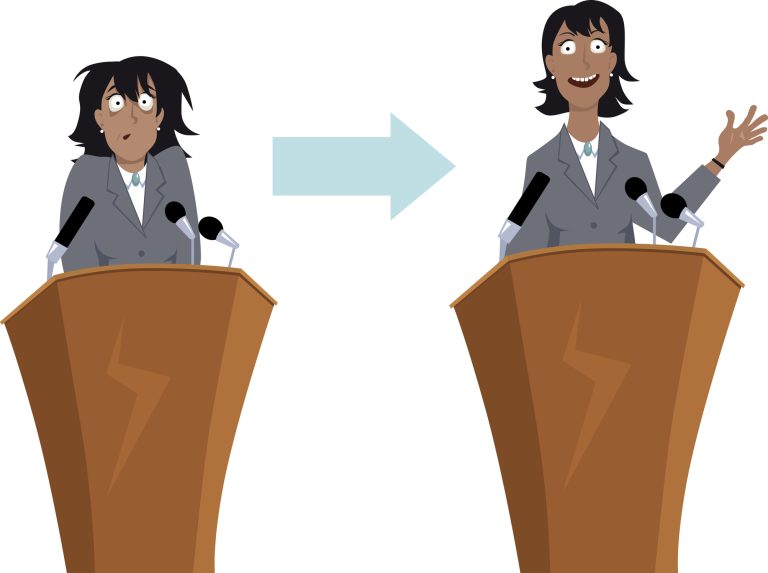What are the Glossophobia Symptoms?
Glossophobia symptoms include dryness in the mouth, weakened tone of voice, trembling voice due to tension, shaking or quivering voice, hesitation words such as ‘umm’ and ‘ah’, stammers or tics, and vocalized pauses. Glossophobia, or the fear of public speaking, is a common phobia that affects many individuals.
Glossophobia — the fear of public speaking — affects a significant portion of the population, and it’s more common than you might think. In fact, research by the National Institute of Mental Health shows that about 77% of people experience some level of anxiety about public speaking. But how do you know if what you’re feeling is normal nervousness or full-blown glossophobia?
In this post, we’ll explore the most common symptoms of glossophobia, backed by psychological insights and real-world examples, to help you recognize and better understand this anxiety disorder.
What is Glossophobia?
Glossophobia is the medical term for a fear of public speaking. It comes from the Greek words glossa (meaning “tongue”) and phobos (meaning “fear”). While it is not officially classified as a standalone mental disorder in the DSM-5, it falls under the umbrella of social anxiety disorders.
The fear can be mild — such as feeling slightly nervous before a presentation — or severe, where a person avoids all public speaking situations, even when it affects their personal or professional life.
What are the Glossophobia Symptoms?
Why Understanding Symptoms Matters
Many people dismiss their fear as just “stage fright.” But recognizing the specific symptoms of glossophobia can help individuals seek the right strategies or professional help to overcome it. The symptoms are not just in the mind — they manifest physically, emotionally, and cognitively.
Let’s break them down in detail.
Physical Symptoms of Glossophobia
These are the bodily reactions that occur when someone is about to speak in public. Often, they are caused by the body’s fight-or-flight response to perceived danger.
When faced with the prospect of speaking in front of an audience, people with glossophobia often experience intense physical reactions. These symptoms are the result of the body’s fight-or-flight response — an ancient survival mechanism designed to help us respond to perceived threats. In the case of glossophobia, the “threat” is social judgment or embarrassment.
Let’s take a deeper look at the most common physical symptoms and what they mean:
1. Sweating (Hyperhidrosis)
When the body senses stress or fear, it activates the sympathetic nervous system, leading to increased sweating. This typically occurs in the:
- Palms (clammy hands)
- Forehead
- Armpits
- Sometimes the entire body
For many, this is one of the most embarrassing and visible signs of nervousness. It can make handling notes or electronic devices difficult during a presentation.
2. Trembling or Shaking
Muscle tension and a surge of adrenaline can lead to noticeable shaking of the hands, legs, lips, or voice. A trembling voice — known as vocal tremor — is especially common and often worsens self-consciousness.
Some speakers grip podiums or fold their hands to hide visible trembling, but the internal sensations can be just as disruptive.
3. Rapid Heartbeat (Tachycardia)
The heart may start racing even before you step in front of the audience. This is your body pumping extra blood to prepare for “action.” While biologically harmless in most cases, it can feel overwhelming and feed further anxiety, especially when accompanied by chest tightness or shortness of breath.
4. Dry Mouth and Throat (Xerostomia)
Under stress, your body reduces saliva production, leading to a dry, sticky feeling in the mouth. This can make it harder to speak clearly, swallow, or even breathe comfortably — often making speakers feel like their mouth is “glued shut.”
Some experience a “clicky” voice or feel the need to sip water frequently during a talk.
5. Shortness of Breath
Rapid, shallow breathing is common during anxiety. You may feel as though you can’t catch your breath or that you’re gasping. This contributes to:
- Lightheadedness
- Chest discomfort
- Vocal strain
Breathing difficulties can make it hard to project your voice, pace your delivery, or maintain focus.
6. Nausea or Stomach Discomfort
The stomach is particularly sensitive to stress. Glossophobia can trigger:
- Butterflies in the stomach
- Cramping or tightness
- Nausea
- In extreme cases, vomiting or diarrhea
This occurs because blood is redirected away from the digestive tract during anxiety, slowing digestion and causing uneasiness.
7. Muscle Tension
Anxiety can cause tightness in the neck, jaw, shoulders, and back. Chronic muscle tension can lead to:
- Headaches
- Stiff posture
- Physical fatigue
It may also make it harder to move naturally on stage or express yourself with gestures.
8. Blushing or Flushing
Fear of public embarrassment can result in facial flushing or blushing, especially for individuals who are sensitive to social evaluation. This is caused by dilation of blood vessels under the skin.
The fear of blushing often becomes a symptom in itself — increasing anxiety about being visibly anxious.
9. Dizziness or Lightheadedness
Hyperventilation (rapid breathing) may reduce carbon dioxide in the blood, leading to feelings of:
- Dizziness
- Faintness
- Spinning sensations
This can make standing or walking in front of a crowd feel unstable, adding to the fear of “losing control.”
10. Choking Sensation or Tight Throat
Some individuals report a constriction in the throat or a feeling that they might choke. This makes it harder to speak clearly and may increase the fear that their voice will “crack” or that they’ll freeze mid-sentence.
Why These Physical Symptoms Matter
While these reactions are biological and temporary, they can feel very real and alarming — especially if they occur just before or during a presentation. Recognizing them as normal stress responses is the first step toward managing glossophobia effectively.
Few Tips
If you’re experiencing any of these symptoms regularly, consider:
- Practicing deep breathing and progressive muscle relaxation
- Seeking CBT or coaching
- Using exposure therapy to build tolerance
- Joining public speaking groups like Toastmasters
With time, the body’s reactions can become milder — and your confidence will grow.
Psychological and Emotional Symptoms
Glossophobia doesn’t just affect the body — it also impacts thoughts, emotions, and self-image. While the physical symptoms of glossophobia are often the most visible, the psychological and emotional impact runs much deeper. These internal experiences are what make glossophobia not just a passing fear, but a form of social anxiety that can interfere with personal growth, confidence, and daily functioning. Below are the most common psychological and emotional symptoms, explained in greater detail:
1. Intense Anxiety or Panic Attacks
When faced with a speaking situation, individuals with glossophobia often experience overwhelming fear. This isn’t just nervousness — it’s a heightened form of anxiety that can escalate into a panic attack. During such episodes, the person might feel:
- Tightness in the chest
- Difficulty breathing
- A racing heart
- A sense of losing control or impending doom
This reaction is typically triggered by the brain’s perception of public speaking as a threat, activating the body’s fight-or-flight system.
Insight: A study published in the Journal of Anxiety Disorders found that public speaking ranked higher than death among commonly feared activities, underscoring the emotional severity of glossophobia.
2. Mental Blocks and Freezing
Glossophobia can cause your mind to go blank right in the middle of a sentence — even if you’ve practiced for hours. This mental block happens because anxiety disrupts your working memory, making it difficult to recall information under pressure.
- You may forget key points or the entire script.
- It often leads to long pauses or confusion during the speech.
- The experience can reinforce a fear of future speaking events.
This “freezing” response is your brain’s way of reacting to what it perceives as danger, making it hard to access logical thinking.
3. Catastrophic Thinking and Overestimation of Risk
People with glossophobia tend to catastrophize, imagining worst-case scenarios such as:
- “I’ll make a fool of myself.”
- “Everyone will judge me.”
- “They’ll never take me seriously again.”
This distorted thinking can cause a cycle of avoidance and heightened fear, even when previous performances were fine. The fear of embarrassment becomes so overwhelming that it overrides rational judgment.
Research Note: According to cognitive-behavioral theories, glossophobia is largely maintained by maladaptive thought patterns and unrealistic expectations about how others will respond.
4. Low Self-Esteem and Self-Doubt
The fear of being judged publicly often eats away at a person’s self-confidence. Individuals may develop a deeply ingrained belief that they are “not good enough” to speak publicly, even when they are knowledgeable and skilled.
- You might compare yourself harshly to others.
- You constantly second-guess your abilities.
- Positive feedback is dismissed or minimized.
Over time, this erodes self-worth and can bleed into other areas of life — like job interviews, team meetings, or social interactions.
5. Anticipatory Anxiety
Even days or weeks before the event, people with glossophobia may experience:
- Trouble sleeping
- Constant worry
- Distracted thinking during everyday tasks
- Repetitive mental rehearsal of what could go wrong
This “countdown anxiety” intensifies as the event approaches, draining emotional energy and making it hard to focus on preparation or other responsibilities.
6. Shame and Embarrassment
Many sufferers of glossophobia feel deep shame about their fear. They may view it as a weakness or failure, especially in a world that often celebrates confident communicators.
- This shame leads to secrecy or isolation.
- Individuals may hide their fear from employers, friends, or teachers.
- Internal criticism becomes harsher: “What’s wrong with me?”
This internalized shame can be more damaging than the fear itself, especially when it leads to avoidance of opportunities for growth.
7. Sense of Being Trapped
During a speech or presentation, someone with glossophobia may feel mentally or emotionally “trapped,” unable to escape the situation. This helpless feeling creates:
- Heightened distress
- Physical symptoms like lightheadedness
- A desire to run away or flee the scene
The emotional toll of being stuck in this discomfort often leads to future avoidance behaviors, reinforcing the phobia.
Why Psychological and Emotional Symptoms
Understanding these deeper emotional and psychological symptoms is key to demystifying glossophobia. It’s not just stage fright. It’s a complex mix of thought patterns, emotional reactions, and learned responses that can be treated with empathy, awareness, and proper support.
Whether through cognitive behavioral therapy, exposure techniques, or even joining a group like Toastmasters, individuals can learn to challenge these fears and rebuild their confidence step by step.
Behavioral Symptoms
Behavioral symptoms are the visible actions or reactions that people with glossophobia exhibit to avoid or cope with public speaking situations. These behaviors can be conscious or unconscious and are often attempts to reduce anxiety or escape from discomfort. Let’s break them down in detail:
1. Avoidance of Speaking Opportunities
Definition: The individual actively avoids any situation that may require speaking in front of others.
Examples:
- Turning down job offers that require presentations.
- Avoiding meetings, school discussions, or social events like weddings and parties.
- Not volunteering in group settings, even when they have valuable input.
Why it happens: Avoidance is a classic behavior in anxiety disorders. The brain associates speaking with a threat and learns to avoid it to prevent discomfort — even at the cost of personal growth.
Long-term impact: Avoiding speaking engagements can limit career advancement, damage self-esteem, and reduce one’s sense of accomplishment or contribution.
2. Over-Preparation or Perfectionism
Definition: In an attempt to cope with fear, some individuals will over-prepare excessively before speaking engagements.
Examples:
- Writing and rewriting speeches dozens of times.
- Memorizing lines word-for-word, fearing even minor errors.
- Practicing excessively, to the point of exhaustion or burnout.
Why it happens: This behavior stems from a fear of failure or being judged. The person believes that perfect preparation is the only way to prevent humiliation or criticism.
Drawback: Ironically, this can increase anxiety because it builds unrealistic expectations, making even small mistakes feel catastrophic.
3. Fidgeting and Nervous Movements
Definition: The individual may unconsciously engage in repetitive or restless movements to manage nervous energy.
Examples:
- Tapping feet or fingers.
- Playing with hair or jewelry.
- Shifting weight frequently or pacing.
- Repeatedly clearing the throat or adjusting clothes.
Why it happens: These actions are typically attempts to release stress or find comfort in a high-anxiety situation. However, they can distract both the speaker and the audience.
4. Reading from Notes or Slides Excessively
Definition: The person becomes overly dependent on notes, slides, or scripts during public speaking events.
Examples:
- Reading every word from the slides instead of making eye contact.
- Keeping eyes glued to cue cards without engaging the audience.
- Avoiding spontaneous speech or interaction.
Why it happens: This behavior stems from a lack of confidence in one’s memory or speaking ability. Relying on written aids feels safer than speaking extemporaneously.
Effect on delivery: It reduces the speaker’s connection with the audience, making the speech feel robotic or disengaged.
5. Rapid Speech or Monotone Voice
Definition: The speaker may rush through their speech or speak in a flat, emotionless tone.
Examples:
- Talking so fast that the message is hard to understand.
- Speaking in a monotonous tone without natural pauses or inflection.
Why it happens: Anxiety can cause a fight-or-flight response, leading the speaker to rush in order to “get it over with.” A monotone voice may result from fear-induced tension or a desire to “hide” emotion.
6. Rehearsing Conversations in the Mind Repeatedly
Definition: Mentally rehearsing how a conversation or speech might go, again and again, sometimes obsessively.
Examples:
- Replaying past speaking failures in the mind.
- Visualizing every word and predicting every possible outcome.
Why it happens: This is a form of mental avoidance or hyper-control, driven by the fear of being caught off guard. While some mental preparation is normal, compulsive rehearsal can backfire by increasing stress.
7. Avoiding Eye Contact During Speech
Definition: The speaker may look away from the audience, focus on the floor, ceiling, or anything else rather than making eye contact.
Examples:
- Looking at the screen, walls, or notes instead of the audience.
- Focusing only on one “safe” person instead of scanning the room.
Why it happens: Eye contact feels like vulnerability. For people with glossophobia, it can trigger intense feelings of self-consciousness, making them feel scrutinized or judged.
8. Last-Minute Excuses or Cancellations
Definition: Making sudden excuses to withdraw from a speaking engagement right before the event.
Examples:
- Claiming to be sick.
- Saying they forgot the date.
- Asking someone else to speak “on their behalf.”
Why it happens: As the event nears, anxiety peaks, and the person seeks any escape route to avoid the overwhelming stress of speaking.
Final Thoughts on Behavioral Symptoms
Behavioral symptoms of glossophobia often serve as coping mechanisms — attempts to reduce or escape the fear of public speaking. However, they usually reinforce the anxiety cycle over time.
Recognizing these behaviors is the first step toward change. With the right awareness, therapy, and practice, many people can replace avoidance and anxiety with confidence and skill.
How Glossophobia Affects Daily Life
The symptoms of glossophobia can significantly affect both personal and professional growth:
- Career impact: Fear of presentations can limit job opportunities, promotions, or performance in meetings.
- Social life: Avoidance of group discussions, weddings, or events where public speaking may be required.
- Academic setbacks: Students may avoid classes or presentations, leading to lower grades and confidence.
According to a 2001 study published in The Journal of Anxiety Disorders, individuals with public speaking anxiety often perceive their performance more negatively than it actually is, reinforcing the cycle of fear and avoidance.
When to Seek Help
If glossophobia is interfering with your quality of life, it may be time to seek help. Treatment options include:
- Cognitive Behavioral Therapy (CBT): Helps reframe negative thoughts.
- Exposure Therapy: Gradual exposure to speaking situations reduces anxiety over time.
- Public Speaking Courses or Clubs: Organizations like Toastmasters International offer a safe space to practice.
- Medication: In some cases, doctors may prescribe anti-anxiety medication for situational use.
Frequently Asked Questions
What Are The Verbal Symptoms Of Glossophobia?
Verbal symptoms of glossophobia include dryness in the mouth, weakened tone of voice, trembling voice, shaking or quivering voice, hesitation words such as ‘umm’ and ‘ah’, stammers or tics, and vocalized pauses.
What Is The Trigger Of Glossophobia?
Glossophobia is triggered by speaking in front of a group of people, whether in social or formal settings, attending conferences or events, and even speaking in front of a small group.
When Does Glossophobia Start?
Glossophobia usually begins in adolescence, and it is a fear of public speaking.
What Are 4 Symptoms Of Fear?
Here are four common symptoms of fear:
1. Dryness in the mouth. 2. Weakened tone of voice and feeling energy less. 3. Trembling voice due to tension. 4. Shaking or quivering voice.
Final Thoughts
Glossophobia symptoms are real, powerful, and surprisingly common — but they are also manageable. Whether your fear is mild or severe, recognizing the symptoms is the first step toward overcoming them. With the right strategies and support, it’s entirely possible to become a confident and comfortable speaker.
Remember: You’re not alone — and your voice deserves to be heard.





